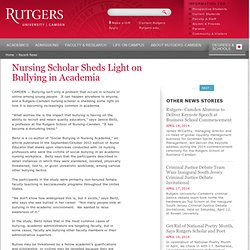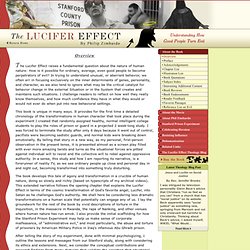

Nursing Scholar Sheds Light on Bullying in Academia. CAMDEN — Bullying isn’t only a problem that occurs in schools or online among young people.

It can happen anywhere to anyone, and a Rutgers–Camden nursing scholar is shedding some light on how it is becoming increasingly common in academia. “What worries me is the impact that bullying is having on the ability to recruit and retain quality educators,” says Janice Beitz, a professor at the Rutgers School of Nursing–Camden. “It has become a disturbing trend.” Anti-Piracy Curriculum for Elementary Schools.
Listen up children: Cheating on your homework or cribbing notes from another student is bad, but not as bad as sharing a music track with a friend, or otherwise depriving the content-industry of its well-earned profits.

That’s one of the messages in a new-school curriculum being developed with the Motion Picture Association of America, the Recording Industry Association of America and the nation’s top ISPs, in a pilot project to be tested in California elementary schools later this year. A near-final draft of the curriculum, obtained by WIRED, shows that it comes in different flavors for every grade from kindergarten through sixth, to keep pace with your developing child’s ability to understand that copying is theft, period. “This thinly disguised corporate propaganda is inaccurate and inappropriate,” says Mitch Stoltz, an intellectual property attorney with the Electronic Frontier Foundation, who reviewed the material at WIRED’s request. The Lucifer Effect. The Stanford prison experiment (SPE) was a study of the psychological effects of becoming a prisoner or prison guard.

The experiment was conducted at Stanford University from August 14–20, 1971, by a team of researchers led by psychology professor Philip Zimbardo.[1] It was funded by the US Office of Naval Research[2] and was of interest to both the US Navy and Marine Corps as an investigation into the causes of conflict between military guards and prisoners. Goals and methods[edit] Zimbardo and his team aimed to test the hypothesis that the inherent personality traits of prisoners and guards are the chief cause of abusive behavior in prison. Participants were recruited and told they would participate in a two-week prison simulation. The Lucifer Effect by Philip Zimbardo. He Lucifer Effect raises a fundamental question about the nature of human nature: How is it possible for ordinary, average, even good people to become perpetrators of evil?

In trying to understand unusual, or aberrant behavior, we often err in focusing exclusively on the inner determinants of genes, personality, and character, as we also tend to ignore what may be the critical catalyst for behavior change in the external Situation or in the System that creates and maintains such situations. I challenge readers to reflect on how well they really know themselves, and how much confidence they have in what they would or would not ever do when put into new behavioral settings. This book is unique in many ways. It provides for the first time a detailed chronology of the transformations in human character that took place during the experiment I created that randomly assigned healthy, normal intelligent college students to play the roles of prison or guard in a projected 2 week-long study.
Studying Economics Turns You Into a Liar. Ever hear the joke about the lying economist? No? Well, neither have I. But we might need to come up with one. Such is the takeaway from a working paper released in January, which I stumbled on while browsing Professor Andres Marroquin's top studies of 2012. Written by a pair of researchers from universities in Montreal and Madrid, it examined whether the study of economics made students more apt to lie for financial gain. Several past experiments have tried to test how people's personal beliefs and background influence their willingness to lie, and one, published in 2009, yielded results suggesting that economics students were more likely to fib than those in other disciplines. Banality of evil. Eichmann in Jerusalem: A Report on the Banality of Evil is a book by political theorist Hannah Arendt, originally published in 1963.

Arendt, a Jew who fled Germany during Adolf Hitler's rise to power, reported on Adolf Eichmann's trial for The New Yorker. The work, according to Hugh Trevor-Roper, is deeply indebted to Raul Hilberg's The Destruction of the European Jews, so much so that Hilberg himself spoke of plagiarism.[1][2][3] Overview[edit] Arendt's subtitle famously introduced the phrase "the banality of evil," which also serves as the final words of the book. In part, at least, the phrase refers to Eichmann's deportment at the trial as the man displayed neither guilt for his actions nor hatred for those trying him, claiming he bore no responsibility because he was simply "doing his job" ("He did his duty...; he not only obeyed orders, he also obeyed the law. " p. 135). Cult of personality. Mind control. Mind control (also known as brainwashing, coercive persuasion, thought control, or thought reform) is an indoctrination process which results in "an impairment of autonomy, an inability to think independently, and a disruption of beliefs and affiliations.

In this context, brainwashing refers to the involuntary reeducation of basic beliefs and values"[1] The term has been applied to any tactic, psychological or otherwise, which can be seen as subverting an individual's sense of control over their own thinking, behavior, emotions or decision making. Theories of brainwashing and of mind control were originally developed to explain how totalitarian regimes appeared to succeed systematically in indoctrinating prisoners of war through propaganda and torture techniques.
These theories were later expanded and modified by psychologists including Jean-Marie Abgrall and Margaret Singer to explain a wider range of phenomena, especially conversions to new religious movements (NRMs).